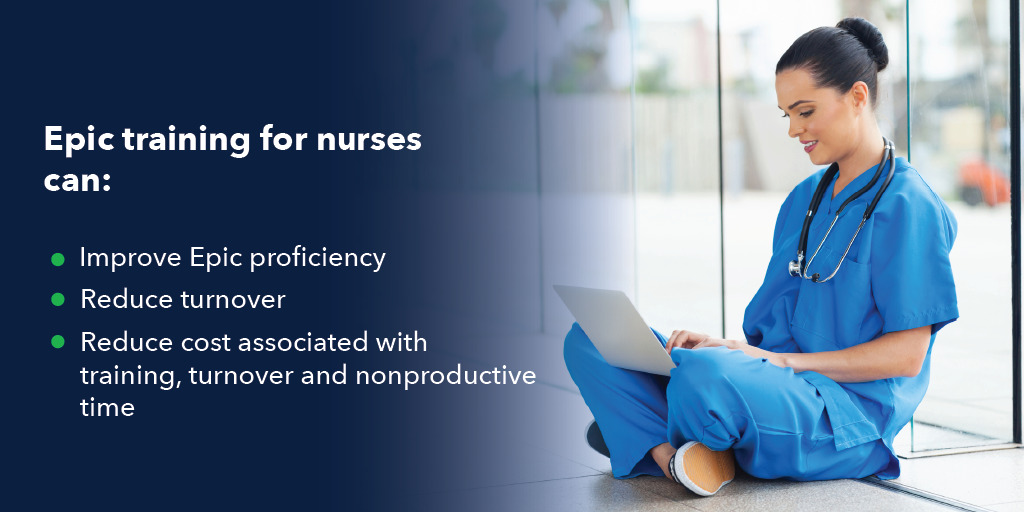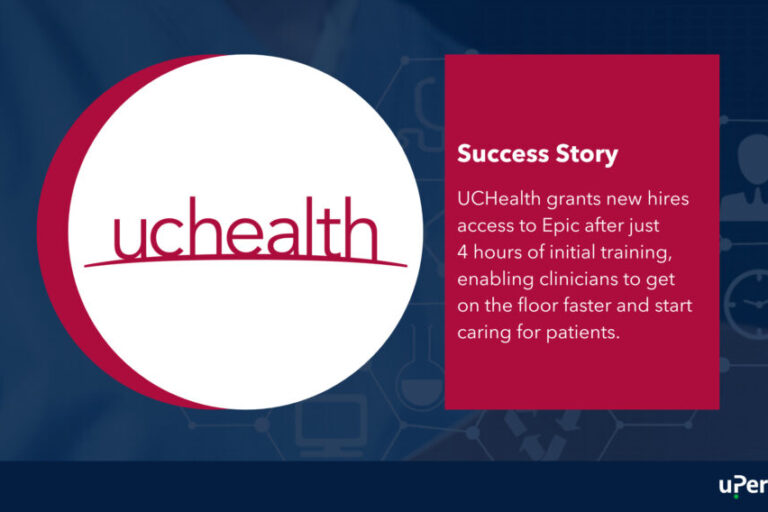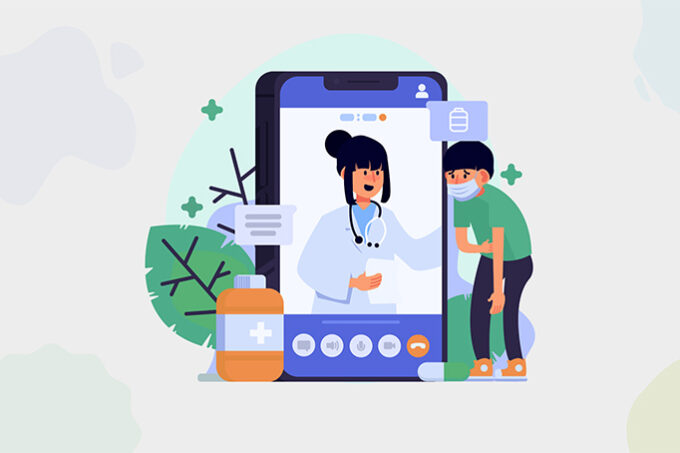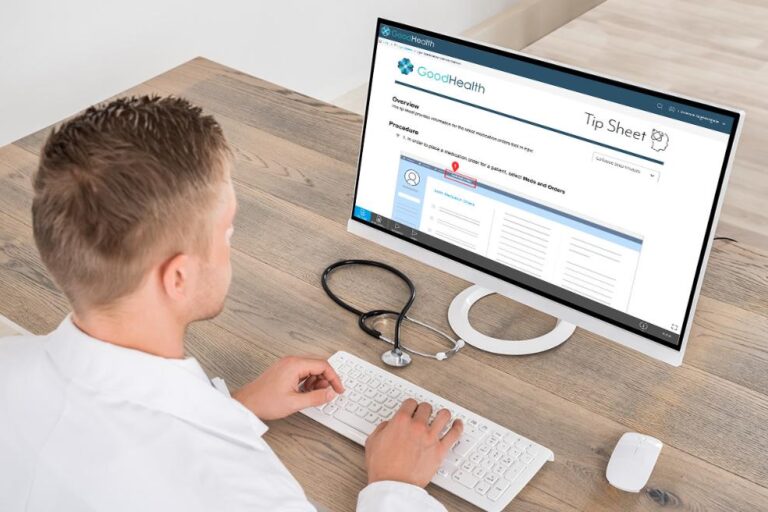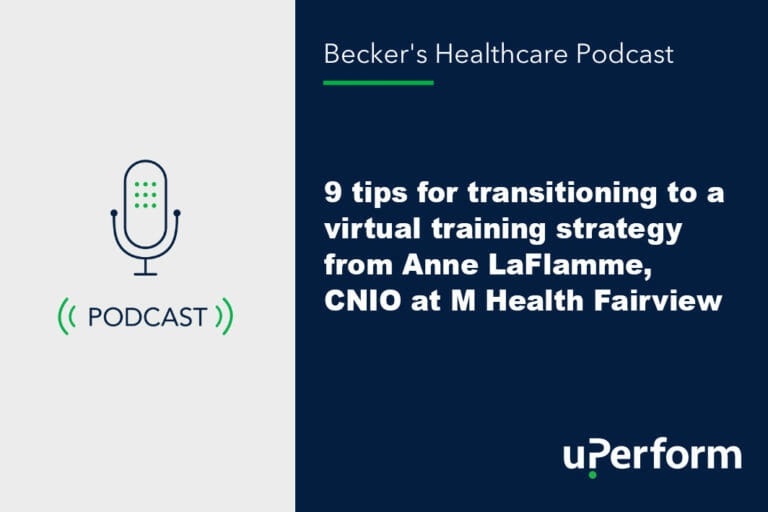As hospitals and healthcare systems search for ways to combat the rising costs of the nursing workforce shortage, one key area to focus on is improving Epic® training for nurses. Comprehensive Epic training drives proficiency, increases job satisfaction and reduces costs associated with training, turnover and nonproductive time.
Why your nurses need Epic training
While Epic is a powerful tool for improving patient care, it can be complex and overwhelming for nurses to learn. This is especially true for nurses who are new to the healthcare field and may not be familiar with electronic health records or have limited software experience.
Unfortunately, the soaring rate of nurse turnover only adds to these challenges. Even for nurses who have experience using Epic, each organization and role will have unique implementations, workflows and processes, meaning they will need retraining every time they change organizations or roles.
Providing general Epic training for all clinicians is not sufficient. Epic training for nurses should be both role- and workflow-specific. This will ensure that they know how Epic functions within your organization. Research shows when nurses feel confident and competent in their use of Epic, they are more likely to stay with their current employer. By reducing turnover and improving Epic proficiency, Epic training for nurses can reduce costs associated with training, turnover and nonproductive time.
UCHealth reduces nurse time in onboarding, improves satisfaction and efficiency
UCHealth overhauled its onboarding and training strategy in 2020. Their new computer-based approach has helped improve satisfaction by 75%, while reducing the time clinicians spend in training and improving efficiency.
Aspirus Health reduces the time nurses spend in Epic
At the 2024 Epic XGM conference, Aspirus Health shared how their new approach to computer-based training has increased satisfaction with training and reduced the time nurses spend in Epic by 50%.
UCHealth reduces nurse time in onboarding, improves satisfaction and efficiency
UCHealth overhauled its onboarding and training strategy in 2020. Their new computer-based approach has helped improve satisfaction by 75%, while reducing the time clinicians spend in training and improving efficiency.
Aspirus Health reduces the time nurses spend in Epic
At the 2024 Epic XGM conference, Aspirus Health shared how their new approach to computer-based training has increased satisfaction with training and reduced the time nurses spend in Epic by 50%.
When to provide Epic training for nurses
Most health organizations offer some form of initial training for new Epic users, including nurses, as part of their onboarding process. While this is a vital component of an effective Epic training strategy, it’s not enough. Given the complexity of the software and frequency of workflow changes, updates and new go-lives, a comprehensive training strategy must support nurses through their entire Epic journey, including:
Onboarding: A thorough Epic onboarding and initial training strategy is essential for both new nurses and the organization. It provides nurses with the base knowledge they need to effectively utilize Epic for their new role, even if they may have prior experience with Epic.
Ongoing support: Learners begin forgetting what they’ve learned as soon as they leave the classroom. Supporting nurses with ongoing training allows them to brush up on skills they may have forgotten or need to improve upon.
Change updates and new go-lives: Frequent Epic change updates and new go-lives add an additional challenge to training nurses. With many hospitals on a semiannual or quarterly release schedule, training teams often find themselves working in a constant state of go-live. Finding a scalable method for delivering Epic training for change updates and new go-lives is essential for the success of both nurses and training teams.
How to scale Epic training for nurses
The challenge most organizations face when trying to improve their Epic training for nurses and providers is a constraint on time, money and personnel. Keeping up with unprecedented rates of nurse turnover and frequent changes and updates to Epic software has many training teams feeling like they are treading water with little resources to make changes. Here are some ways that can help organizations scale their Epic training for nurses:
1. Establish a virtual training strategy
A virtual Epic training strategy helps better support nurses and providers, reduces overall cost and allows training teams to scale efforts and provide more value to the organization through 1-on-1 coaching and support. A virtual training strategy reduces the time and physical space devoted to in-classroom instruction. Nurses get back to patient care faster, and training staff spends more time creating learning opportunities that are specific to user workflows and roles.
2. Offer training in the Epic workflow
Finding time to engage with training materials is half the battle for busy nurses. Delivering Epic training to nurses in their workflow allows them to access materials when and where they need them. If a nurse can’t remember how to perform a specific task, they can quickly and easily access the support they need. This level also cuts down on calls to the help desk.
3. Centralize your learning content
As you continue to scale your Epic training, your library of learning content will continue to grow across multiple formats and platforms, like tip sheets and eLearning courses hosted in your Learning Management System (LMS). Centralizing it on a single content management platform will help your training team:
- Deliver training to new hires quickly and efficiently amid rising turnover rates
- Establish a single source of truth
- Refresh content for Epic updates, changes and new go-lives
- Manage who has access to what content based on their role or workflow
- Maintain accuracy and branding guidelines for affiliates
- Deliver Epic training for nurses with uPerform
uPerform is a valuable tool for providing Epic training for nurses, as well as your entire Epic user base. Our just-in-time training platform ensures your nurses are only getting the training that is relevant to their role and workflow. It centralizes learning content from across your learning ecosystem, making content management more manageable. Nurses and providers gain access to support materials directly in their workflow, saving them valuable time and reducing frustration with the EHR.
With uPerform, health systems are getting providers through training and on to patient care faster, improving satisfaction with the EHR and increasing engagement with learning materials.
Learn more about uPerform
Epic is a trademark or registered trademark of Epic Systems Corporation.

